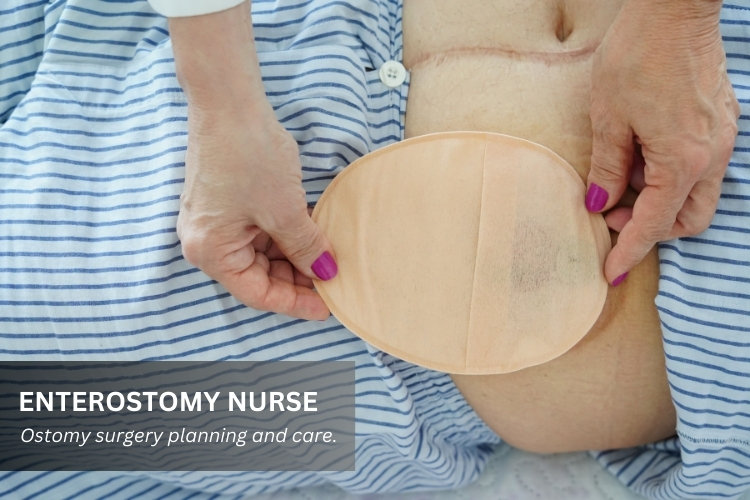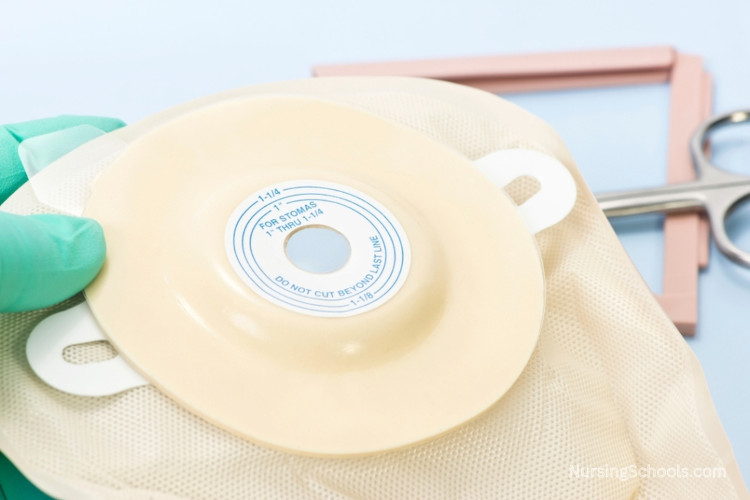Enterostomy Nurse
Healthcare Career Guide

Overview
What is an Enterostomy Nurse?
An Enterostomy Nurse, also known as a Wound, Ostomy, and Continence (WOC) Nurse, specializes in caring for patients with ostomies, fistulas, and other gastrointestinal or urinary diversions. These nurses provide education, support, and medical care to patients who require stomas due to conditions such as colorectal cancer, Crohn's disease, or bladder cancer.
Enterostomy Nurses play a vital role in helping patients adapt to life with an ostomy. They provide preoperative and postoperative care, teach patients and caregivers how to manage ostomy appliances, and address complications such as skin irritation and infection. In addition to ostomy management, they often assist patients with wound care and continence issues.
With their specialized training, Enterostomy Nurses improve patient outcomes, enhance quality of life, and promote independence in managing ostomies and related conditions.
Education
How Do I Become an Enterostomy Nurse?
Becoming an Enterostomy Nurse requires education, certification, clinical experience, and specialized WOC training. Follow these steps to enter this challenging and rewarding healthcare career:
- Earn a Nursing Degree. Complete an Associate Degree in Nursing (ADN) or Bachelor of Science in Nursing (BSN). A BSN is often preferred for specialized nursing roles such as enterostomy care.
- Pass the NCLEX-RN. Obtain your nursing license by passing the National Council Licensure Examination for Registered Nurses (NCLEX-RN).
- Gain Clinical Experience. Work as a Registered Nurse (RN) in settings such as surgical, wound care, or gastroenterology units to build expertise in patient care.
- Pursue Wound, Ostomy, and Continence (WOC) Training. Complete a specialized WOC Nursing Education Program accredited by the Wound, Ostomy, and Continence Nursing Certification Board (WOCNCB).
- Obtain Certification. Earn the Certified Wound, Ostomy, and Continence Nurse (CWOCN) credential to demonstrate expertise in enterostomy and wound care.
Becoming an Enterostomy Nurse typically takes 4-6 years, including nursing school, licensure, and specialized training. Certification enhances credibility and career advancement opportunities in this field.

Average Salary
How Much Does an Enterostomy Nurse Make?
Salaries for Enterostomy Nurses vary based on location, experience, and certifications. On average, an Enterostomy Nurse can expect to earn between $75,000 and $100,000 annually.
Average annual salary for an Enterostomy Nurse:
- Entry-level: $75,000 - $85,000 per year.
- Mid-career: $85,000 - $95,000 per year.
- Experienced: $95,000 - $100,000 per year.
The U.S. Department of Labor reports that Enterostomy Nurses earn an average hourly wage of approximately $39.00 per hour. Assuming a 40-hour workweek, this equates to an annual salary of $81,120. The lowest 10% earn less than $33.00 per hour, while the highest 10% earn more than $47.00 per hour, resulting in an annual salary range of $68,640 to $97,760 per year.
Job Duties
What Does an Enterostomy Nurse Do?
Enterostomy Nurses provide specialized care for patients with ostomies and complex wounds. Their work involves both direct patient care and educational support to improve patient outcomes and quality of life.
The most common job duties of an Enterostomy Nurse:
- Assessing Patients. Evaluate patients' conditions before and after ostomy surgery, providing guidance on management and treatment.
- Ostomy Site Selection and Education. Help patients prepare for surgery by selecting appropriate stoma sites and educating them about life with an ostomy.
- Providing Postoperative Ostomy Care. Teach patients and caregivers how to manage ostomy appliances, prevent complications, and promote healing.
- Managing Wound and Skin Complications. Treat skin irritation, infections, and other complications associated with ostomies and surgical wounds.
- Collaborating with Healthcare Teams. Work alongside surgeons, gastroenterologists, gastroenterology nurses, and dietitians to develop personalized care plans for patients.
- Educating Patients and Families. Offer ongoing education and emotional support to help patients adjust to lifestyle changes after surgery.
- Documenting Patient Progress. Maintain accurate records of treatment plans, wound assessments, and patient education sessions.
- Advanced Duties. Experienced Enterostomy Nurses may conduct research, develop hospital protocols, or mentor new nurses in ostomy and wound care.
Enterostomy Nurses primarily work in hospitals, outpatient wound care clinics, home healthcare, and rehabilitation centers. Their expertise is crucial in ensuring patients receive the best possible care for ostomy and wound management.

Essential Skills
What Skills Does an Enterostomy Nurse Need?
Enterostomy Nurses require a unique combination of clinical expertise, problem-solving skills, and the ability to provide compassionate education and support. These skills allow them to help patients adapt to ostomies while ensuring effective wound management.
Here are some of the skills an Enterostomy Nurse needs to succeed:
- Technical Proficiency. Master the use of ostomy appliances, wound dressings, and skin protection techniques.
- Patient Education. Teach patients and caregivers how to manage ostomies and prevent complications.
- Attention to Detail. Monitor patients for signs of infection, skin irritation, and other complications.
- Communication. Provide clear explanations to patients, families, and healthcare teams about ostomy care and wound management.
- Problem-Solving. Address challenges related to stoma care, such as leakage, discomfort, or skin breakdown.
- Empathy and Support. Offer emotional reassurance to patients adjusting to life with an ostomy.
- Collaboration. Work with multidisciplinary teams to provide comprehensive care plans.
- Adaptability. Adjust treatment approaches based on individual patient needs and medical conditions.
One of the greatest challenges of being an Enterostomy Nurse is helping patients cope with the emotional and physical impact of ostomy surgery. However, the rewards include seeing patients regain confidence and independence in managing their condition.
Last updated: March 2, 2025
References:
- Registered Nurses. Bureau of Labor Statistics, U.S. Department of Labor. Occupational Outlook Handbook. Retrieved March 2, 2025.
- Wound, Ostomy, and Continence Nurse. Johnson & Johnson, Nursing Career. Retrieved March 2, 2025.
- Wound and Enterostomal Nurse Salary. Salary.com, Healthcare Profile. Retrieved March 2, 2025.
- WOCNCB Certification. Wound, Ostomy, and Continence Nursing Certification Board. Retrieved March 2, 2025.
- Ostomy, Wound, and Continence Care. World Council of Enterostomal Therapists. Retrieved March 2, 2025.
- Journal of Wound, Ostomy, and Continence Nursing. Wound, Ostomy, and Continence Nurses Society. Retrieved March 2, 2025.
- Wound and Ostomy. University of Pittsburgh Schools of the Health Sciences, Children's Hospital of Pittsburgh. Retrieved March 2, 2025.
- Wound Ostomy Continence Nursing. Rutgers-Camden School of Nursing, Nursing Programs. Retrieved March 2, 2025.


